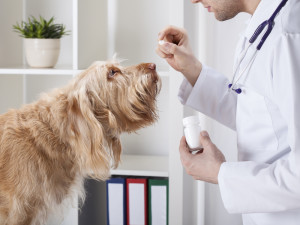Vets Are at High Risk For Compassion Fatigue—Here Are 4 Ways You Can Help
It’s extra important to be nice to the vet in your life.

Share Article
Like emergency room doctors or family lawyers, veterinarians see most clients on something other than their best day. Anxiety makes some of them impatient, treatment fees make others surly. The whole experience of a vet visit is often new and stressful for both the human and the animal. And unlike almost all other health professionals, vets are called upon to euthanize their patients.
As NPR recently reportedopens in new tab, for these and other reasons — including perfectionism and financial stress — today’s vets are at an especially high-risk for burnout, compassion fatigueopens in new tab (the combination of emotional, physical, psychological, and spiritual exhaustion), or worse. In 2019, the CDC reportedopens in new tab that male vets are twice as likely to die by suicide than members of the general population, and female vets are 3.5 times as likely.
As Anna Spidel of Side Effects Public Media told NPR, some studies point to access to euthanasia drugs as another reason why vets may be at heightened risk for suicide. She referred to epidemiologist Suzanne Tomasi, who suggests putting stickers with crisis hotline numbers inside of drug lock boxes.
Our resident expert, Dr. Zay Satchu,opens in new tab founder of cutting-edge NYC vet clinic and vet-support project Bond Vetopens in new tab, says “there’s no silver bullet” for addressing the layered emotional challenges in the field. “Most people understand the ups and downs vets face day-to-day,” he says. “People might not realize how overworked and underpaid doctors can be due to a lack of operational efficiency in a typical veterinary environment.” Vets tend not to have HR or professional growth support.
“All of this, coupled with attempting to meet client demands while balancing an animal’s life with the cost of care that their human can provide, creates a very difficult environment to be successful in — emotionally and financially” Dr. Zay says.
We owe it to ourselves and our animals to know how to support the professionals who play such a crucial role in our lives. Ahead, Dr. Zay points to four basic ways we can forge a great relationship with our vet and set our pets up for success.
Plan ahead
“I really urge pet parents to invest in pet insurance early on in their pet’s life — it is the absolute best approach to balance the inevitable need for medical care your pet will experience. Too often we see situations arise — unfortunately too late most of the time — in which pets’ lives are at stake due to their human’s inability to afford the care their pets need. Having an insurance plan that, at minimum, covers accidents, emergencies, and illnesses makes decisions on care much less stressful. We see better patient outcomes when pet parents don’t have to worry about the cost of an extra diagnostic test or life-saving procedure. It can also be helpful with bigger procedures, such as dental cleanings that can be costly later in a pet’s life. There are many plans out there. I personally use Trupanion pet insurance — their plans are curated for pet parents who want to have support in case of illness or emergency.”
Trust us
“The veterinary team — though a group of individuals who entered the space initially because they love animals — are educated, licensed medical professionals. Their experience and knowledge shouldn’t be discredited by what you’ve heard on an online forum or through a friend or employee at a local pet shop. As medical professionals, we value the relationships you have with those involved in your pet’s ecosystem, but trust us when we recommend certain things, be it food, medication, or general care. We’re here to support the human-animal bond. Our job is to advocate for your pet and educate you as thoroughly as possible.”
Be honest
“Be open and honest with us, every step of the way. There is no judgement within the four walls of an exam room or on a virtual visit or phone call. Our job is to do right by you and your pet, and though we’ll always recommend the best approach, we understand that it may not work for everyone. Tell us about your limitations and share your stories, and we’ll respect your decisions and limitations. We ultimately want what’s best for your pet — allow us to help within our capacities.”
Ask questions
“Welcoming a pet into the family is one of the most exciting times in a pet parent’s journey, but it can also be one of the most stressful. For your first vet visit, come prepared with questions. And don’t worry: If you forget to ask something during the visit, we’re here for you by phone. Additionally, if your pet is healthy, I typically recommend owners spend several days at minimum with their new pet before visiting the vet. At Bond Vetopens in new tab, we offer free puppy/kitten concierge consultations so pet parents can get all of their questions answered on topics ranging from behavior to vaccines and general support. This gives them a chance to get to know their new family member and figure out what questions they may have.”

Chris Norris
Chris Norris is a writer, reporter, author, and longtime companion to West Highland Terrier Gus, recently departed but intensely loved. He has written for The New Yorker, New York Magazine, The New York Times Magazine, Rolling Stone, GQ, Details, and NPR’s All Things Considered, and is the co-author of Tao of Wu. He lives in New York City with his wife and 10-year-old son.
Related articles
![French bulldog puppy looking scared at vet]()
10 Things to Ask at Your First Vet Visit
There are no stupid questions — well, when it comes to your dog’s health.
![Brown Labrador lifting front leg]()
How to Get a Head Start on Your Pet’s Health
Spot lumps, limps, and lethargy early on.
![Man hugs his dog to his face]()
How Will I Know When It’s Time?
End-of-life veterinary specialist Dr. Shea Cox on how to make the most difficult decision in your pet parenting journey.
![Close-up of a Merle coated Greyhound dog laying in the lap of their pet parent on the bed]()
How to Give Relief to Your Dog With a Chronic Condition
What are the best ways to manage a dog’s pain?
![dog owner sad and comforting fluffy dog]()
How to Navigate Tough Decisions About Your Pet
Lessons on how to cope with a serious health diagnosis.
![A vet holding medicine near a dogs face]()
How to Find a Veterinary Specialist
Just like your doctor would refer to you a specialist for expert care for a complicated issue, your vet may do the same for your dog.








